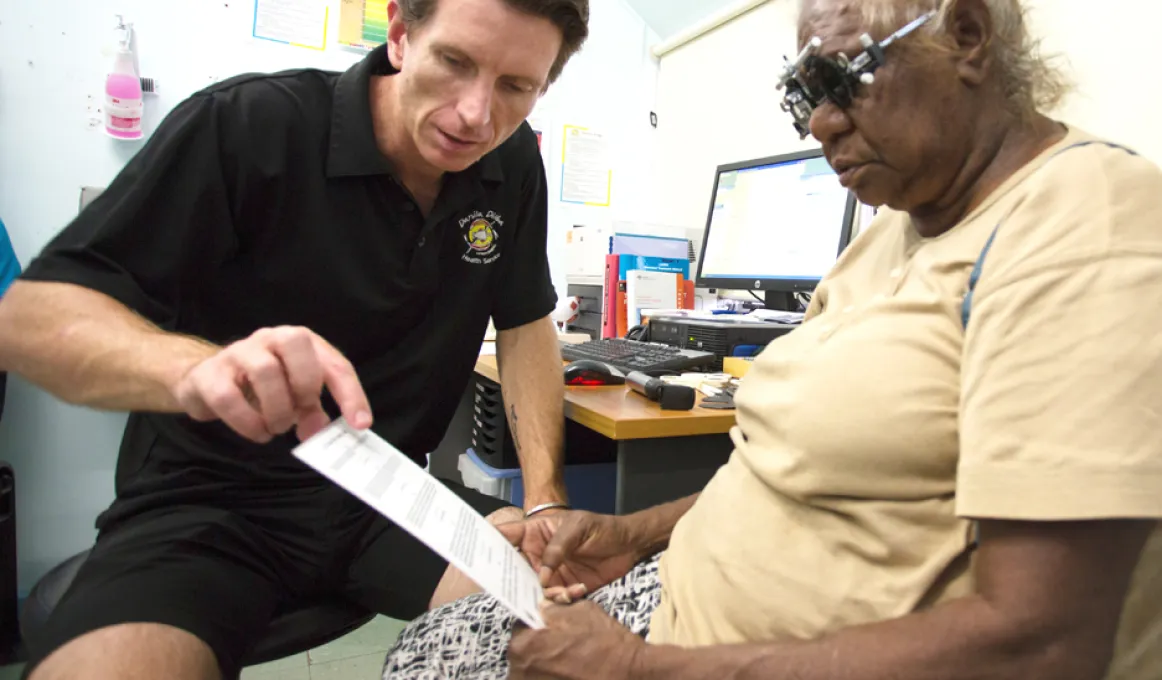Seeing a healthier future for remote communities

People in remote communities are enjoying better eye healthcare thanks to the eye health team from the Brien Holden Vision Institute.
People in remote communities are enjoying better eye healthcare thanks to the eye health team from the Brien Holden Vision Institute.
With funding from the Australian Government’s Visiting Optometrist Scheme (VOS), optometrist and his colleague Michelle Pollard regularly visit eighty two remote communities around the NT performing eye checks and preventing vision loss.
“In remote communities there are a lot of eye problems,” Luke said.
“Indigenous children generally have very good sight and are five times less likely to have eye problems than non-Indigenous children, but by the time they become adults, Indigenous people are six times more likely to have eyesight problems than other Australians.
“Part of this problem is lack of access to optometrists and we’ve spent a lot of time trying to improve this access to eye care,” Luke said.
“The number one reason people don’t see well is that they need glasses, and you need to visit an optometrist to get glasses, so we are working to increase the number of Aboriginal people in remote communities who can access glasses,” Luke said.
“Aboriginal people are also more likely to have diabetes than the rest of Australia, so annual eye check-ups for anyone with diabetes is vital. Diabetes can lead to poor vision and when you notice that you’re having problems with your sight it is too late to save your eyesight,” he said.
Luke says that Brien Holden Vision Institute’s determination to offer a culturally appropriate service has led to positive changes around community attitudes to eye health.
“Clinics are conducted within primary health care clinics, either Aboriginal Medical Services or government run health clinics,” Luke said.
“We work closely with the clinics and local health workers, who advise us on local attitudes and cultural sensitivities. This has led to more patient numbers as locals are realising the importance of eye health,” Luke said.
“We tell them that if they need glasses, the cost is subsidised through the Northern Territory Government’s low cost spectacle scheme, and if they have cataracts we can refer them to ophthalmologists for surgery.
“Ultimately, our aim is to achieve eye health equality for Indigenous Australians and while there is still work to do to reach this, it is great to visit communities and see locals who had vision problems now much happier with their eyesight,” he said.
Find out more
The Australian Government is committed to closing the gap and achieving health equality between Indigenous and non-Indigenous Australians.
As a result, the Australian Government funds the Visiting Optometrists Scheme (VOS), which supports optometrists to deliver eye checks in regional and remote locations.
The Brien Holden Vision Institute is a Non-Government Organisation dedicated to delivering culturally acceptable eye care services to regions where it is urgently required. Through its Aboriginal Vision programme, optometrists like Luke Arkapaw have conducted over 10 000 eye examinations throughout the Northern Territory and over 35 000 examinations at 111 locations in remote and regional New South Wales.
Helen Summers Optometry and Eyewise also provide VOS services in the Northern Territory.